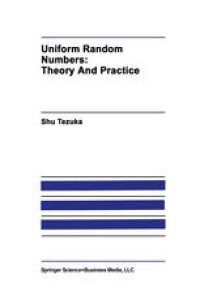
Ebook: Uniform Random Numbers: Theory and Practice
Author: Shu Tezuka (auth.)
- Tags: Calculus of Variations and Optimal Control, Optimization, Systems Theory Control
- Series: The Springer International Series in Engineering and Computer Science 315
- Year: 1995
- Publisher: Springer US
- Edition: 1
- Language: English
- pdf
In earlier forewords to the books in this series on Discrete Event Dynamic Systems (DEDS), we have dwelt on the pervasive nature of DEDS in our human-made world. From manufacturing plants to computer/communication networks, from traffic systems to command-and-control, modern civilization cannot function without the smooth operation of such systems. Yet mathemat ical tools for the analysis and synthesis of DEDS are nascent when compared to the well developed machinery of the continuous variable dynamic systems char acterized by differential equations. The performance evaluation tool of choice for DEDS is discrete event simulation both on account of its generality and its explicit incorporation of randomness. As it is well known to students of simulation, the heart of the random event simulation is the uniform random number generator. Not so well known to the practitioners are the philosophical and mathematical bases of generating "random" number sequence from deterministic algorithms. This editor can still recall his own painful introduction to the issues during the early 80's when he attempted to do the first perturbation analysis (PA) experiments on a per sonal computer which, unbeknownst to him, had a random number generator with a period of only 32,768 numbers. It is no exaggeration to say that the development of PA was derailed for some time due to this ignorance of the fundamentals of random number generation.
Uniform Random Numbers: Theory and Practice provides a comprehensive exposition of major developments over the last decade in uniform random number generation for practical use. The book meets the needs of general readers who are interested in state-of-the-art algorithmic methods for generating `randomness' on a computer. Since the emphasis is on practice in relation to the theoretical background of uniform random numbers, the discussion of interesting, but rather philosophical questions concerning randomness itself is limited to some appropriate references.
Uniform Random Numbers: Theory and Practice provides a comprehensive exposition of major developments over the last decade in uniform random number generation for practical use. The book meets the needs of general readers who are interested in state-of-the-art algorithmic methods for generating `randomness' on a computer. Since the emphasis is on practice in relation to the theoretical background of uniform random numbers, the discussion of interesting, but rather philosophical questions concerning randomness itself is limited to some appropriate references.
Content:
Front Matter....Pages i-xii
Introduction....Pages 1-6
Preliminaries from Number Theory....Pages 7-55
Linear Congruential Generators....Pages 57-82
Beyond Linear Congruential Generators....Pages 83-142
Statistical Tests....Pages 143-160
Derandomization....Pages 161-192
Back Matter....Pages 193-209
Uniform Random Numbers: Theory and Practice provides a comprehensive exposition of major developments over the last decade in uniform random number generation for practical use. The book meets the needs of general readers who are interested in state-of-the-art algorithmic methods for generating `randomness' on a computer. Since the emphasis is on practice in relation to the theoretical background of uniform random numbers, the discussion of interesting, but rather philosophical questions concerning randomness itself is limited to some appropriate references.
Content:
Front Matter....Pages i-xii
Introduction....Pages 1-6
Preliminaries from Number Theory....Pages 7-55
Linear Congruential Generators....Pages 57-82
Beyond Linear Congruential Generators....Pages 83-142
Statistical Tests....Pages 143-160
Derandomization....Pages 161-192
Back Matter....Pages 193-209
....